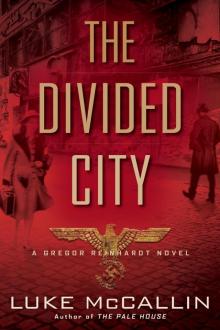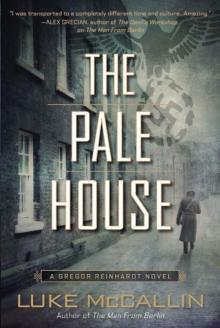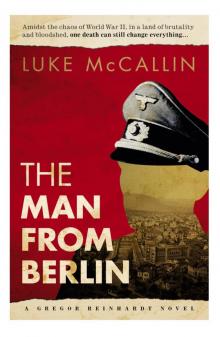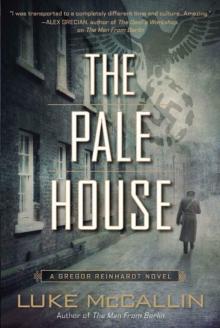- Home
- Luke McCallin
The Pale House Page 17
The Pale House Read online
Page 17
“I am not sure I understand, Mr. . Are you telling me you expect me to work for you?”
“You already work for me. For our cause.”
“That is not true.”
“How is not true? Did you not discuss this with Muamer ?”
“No. No. We never talked about me working for you. I was—” Reinhardt paused, suddenly, desperately afraid, filmed with sweat despite the cold. “ understood. It was my choice. My . . . path to find and follow.”
“Pretty words, Captain.”
“Then ask him. He will tell you.”
“Fine words but of no use to me, now. You are here. I have need of you.” was implacable, holding up a hand, a tight shake of his head behind it, stemming any counter from Reinhardt. “Only listen, Captain, and understand. You will leave here. I have no wish for killing you. But you will work for me. Must I make clear the . . .” He paused, searching for the word, his eyes drifting away, then back. “Must I make clear the implications to you? The wrong word at the wrong time.”
“You are blackmailing me?” cocked his head. “Threatening me.”
“I am,” said, simply. “I am also offering you choice to act, and opportunity to act. Have you not been looking for this? Why else would you walk around so evidently in the old town, today? Why else would you let Simo see you at the hospital?”
“I will not betray anyone to you,” said Reinhardt, shaken by how close words had come to the core of his own dilemma of how and when to actually do something about what he felt and believed in.
“Fine words again, Captain. Betrayal is never easy,” acknowledged. “But stop first to think. Some things and some people are worth betraying. You do not think? Of course they are. You would not be here, otherwise. But do not worry. I will not ask you for betrayal. Only listen, now, to what I have to ask to you.”
“I will listen. Do you smoke? I have cigarettes.” nodded, and Reinhardt carefully took his cigarettes from his pocket. He lit two, passed one to . The Partisan drew deeply on it, nodded appreciatively, then leaned forward slowly.
“So, Captain. Tell me. Where are the Ustaše all going?”
“This war is coming to an end,” said. “A new peace is coming. In that new peace, there will not be room for the divisions of the past. We will be one people. One united people.” paused, drawing on his cigarette, then flicked ash on the floor. “There will not be place for the Ustaše in that world. They will be wiped out. This is necessary.
“There can be no place of retreat for them. No place for them to run to. To regroup. To come back and haunt us. There can be no place of exile for them, like Italy before the war, or Spain, now. There can be no more assassinations by the Ustaše, like that of the king in Marseille. I have no illusions, Captain. Those we cannot kill on the battlefield, those we cannot capture and kill off it, they will run. We will not catch them all, and I care little for the little fishes. It is the big fishes I want. Them, they cannot be allowed to get away. They must pay for what they have done. And they must pay for who they have been. Am I making sense to you?”
Reinhardt nodded. was implacable in the way he talked, his voice hypnotic in its slow, precise diction. He kept his head low down on those big shoulders, and his eyes focused just a fraction below Reinhardt’s, as if they were skewed, ever so slightly, at a place just out of touch with this world. Like , was a man of the future, compelled to live in the present.
“Not long ago, maybe a month ago, we began to hear rumors. There were divisions in the Ustaše. About whether to stay here and fight, or to leave, to regroup. And there were discussions about other plans. Longer plans. Plans that looked beyond the here, and the tomorrow, and the week next, and looked more to the future. The kind of plans we were afraid of.
“About a week ago, three Ustaše vanished. These three are not three of those we would consider as little fishes. They are big ones. Very big. We do not know where they went. We do know that —him, you know, of course—was furious about this. There was almost a purge of the Pale House, but he was convinced to stop that by his superiors in Zagreb.
“At the same time those three vanished, we noticed someone at the Pale House. This person was coming and going. He drove a car, and wore a uniform, and both were of your army, but he was not the Ustaše liaison officer, Langenkamp. Him we know of. We wondered who he was, this man. He was no officer. He came at night, always. We followed him, but could not follow him back to where he came from. So we decided to stop him. We stopped his car, and took him. Unfortunately, he did not tell us much, but he told us some interesting things. Although he drove a German car and wore a German uniform, he was not a German. He was Shiptar. An Albanian. He had a tattoo, here, on his shoulder. An Albanian eagle, and the letters SSVT. They mean ‘Shqipëria Shqiptarëve, Vdekje Tradhëtarëvet.’ ‘Albania for the Albanians, Death to the Traitors.’ The man was a member of Balli Kombëtar. You know of Balli Kombëtar?”
“Albanian nationalists, and anti-Communists. Many of them fought with the Italians, then the Germans, in Albania, and some of them fought in the SS Skanderbeg Division.” inclined his head, almost the only movement he seemed to make. “What did this man say to you?”
“He said little. Not much of it made sense, and we were rushed with him. He was not strong enough for the questioning. We did not want to alert the Ustaše. So we put him back in his car, we made things look like a car crash, and left everything.”
“What uniform was he wearing? Can you describe it?”
“German,” said , his brows lowering again.
“What rank, or insignia?” frowned, looking at Simo. “There had to be something,” Reinhardt insisted.
“A patch. A red triangle,” Simo said, and nodded. “On the shoulder.”
“I see this is familiar,” said as he stubbed his cigarette out on the table and left it there. “Tell me of this uniform.”
“The red triangle is the symbol of a penal battalion,” Reinhardt said. frowned and shook his head, not understanding. “A punishment unit.”
“Shtrafbat,” Simo murmured. face lightened, and he motioned Reinhardt to continue.
“There is a penal battalion in Sarajevo, headquartered at the Ottoman fortress on Vratnik.”
“Tell me of it.”
“I do not know that much. It mainly does support work. Construction. Transportation. And there is, apparently, a large number of foreign volunteers in it. Which would explain the man being an Albanian. There are some in the unit. Now, let me ask you some things. Did the Partisans have anything to do with the deaths of three German soldiers last night, in Logavina?” shook his head, that slight frown pulling his face down. “Did the Partisans have anything to do with a massacre of civilians in the forests to the east of the town, two days ago?”
“At the logging site?”
“You know of it?”
“The site or the deaths? Both. We attacked the site in the past.”
“Why?”
“It was run by the German Army.” This was news to Reinhardt. “We had nothing to do with those deaths. Why are you asking?”
“I was a policeman, Mr. , as I’m sure you know. I am eliminating possibilities.”
“You are investigating these deaths?”
“Murders. Of the Feldjaeger, yes, I am.”
“Will it get in the way of what I ask of you?”
Reinhardt smiled, and it was something sardonic, an acidic twist of his lips he could not control. “Mr. , I . . .” He stopped, searching for the right words. “You know, you are asking me to serve two masters, pursue two ends.”
“Maybe they will not be so far apart as you think, Captain. If we did not kill those people—and I assure you we did not—it does not leave so many suspects.”
There was a soft sound of movement behind , and one of the men leaned forward into the light. “Druže, trebalo bi razmisliti o odlasku. Ovdje s
mo bili predugo.”
“, momak,” said, holding up a hand and all the while keeping his eyes on Reinhardt. The man subsided back into the dark. “My men are worried we have been here too long. I need to leave, Captain. But you will find out where those three Ustaše have gone, and whether the Germans have had anything to do with it. And you will find what is this connection with a German penal battalion.”
“Respectfully, how do you expect me to do that?” It sounded formulaic, protest for protest’s sake. Reinhardt knew it, and seemed to hear it, although his broad face remained blank as he stood up.
“You will find a way. You are a resourceful man, Captain. You must be, to be still alive and thinking the way you do.”
Reinhardt stood as well, feeling a surge of anger, that impulse to push back at those who sought to channel him. “You claim to know a lot about me for someone who has just met me, Mr. .”
looked back at him, and a smile chipped across the stone façade of his. “So, there is some spirit in there.” Reinhardt flushed, as he was meant to, thankful the yellow lantern-light spared his coloring. “I know some. I can guess more. The rest, I do not care about. That is why I have trust, Captain. I trust you are a survivor. Although I think it is not what you want to be, I will use that for myself and for my cause. I believe, am I right, that Muamer and you once talked of something similar?”
Reinhardt nodded, saying nothing, biting back a remark that Muamer and were cut from different cloth, the doctor having been so much more attuned to Reinhardt’s state of mind at that time, so much more sensitive to the restrictions Reinhardt felt around him.
“Nothing more? Then Simo will take you back to the theater. He will be back in touch with you shortly.”
“You leave me no option?”
“None,” said , simply, and turned to go.
“Mr. . A moment.” paused, looking back. “Where is Dr. ?”
stared back at Reinhardt, his flat nose flaring out as he took a long breath in. “He is dead, Captain. Executed, after Operation Schwarz. He would not leave the wounded. And when the Germans overran the hospital camp . . . They shot them. All the doctors. All the nurses. All the wounded.”
They stared hard at each other, each of them with a memory of that one man between them. made to go again, and again he paused. “Perhaps . . .” He paused, though, whatever he might have said going unsaid, as if words could not bridge that sudden gulf of loss, and he turned and left, one of his men preceding him out a door, two more following.
Reinhardt stared after him, then turned as Simo tapped him on the shoulder, handing him a piece of paper. He glanced at it, noting the three names written on it—Bozidar , Tomislav Dubreta, Zvonimir Saulan—and then folded it, almost crumpled it, into his pocket.
“You knew? About ?” Simo nodded. Reinhardt felt empty, sick, even, at the news, even though he had feared such ever since the end of Schwarz, and the orders given to the German armies to take no prisoners. He had hoped, a small harbor he looked into from time to time, that the little doctor might have made it out of those forests alive.
“It is time to go, Captain.”
It was just him and Simo on the way back down the crooked corridors and cramped staircases that threaded the walls and gaps between and through the buildings. Reinhardt took no notice of it, thinking only of what he had just heard, and that news of , and he was surprised when Simo laid his big hand on his shoulder in that room behind the bar, and he noticed suddenly the bearded Partisan was there, his ear against the door into the foyer.
“Do not act differently, Captain. It will be noticed. Do not look for us. We will find you.” Simo looked to the other man for the all clear, and when it came, he handed Reinhardt back his pistol as the bearded Partisan slipped back past them.
“I’m sorry, Simo. For .” Reinhardt paused with his hand on the door and turned, but the room was empty.
Reinhardt made his way back into the theater, back into the warmth of the crowd, but the heat was stifling—unbearable even—the words and laughter a buffet of noise he could not absorb, and could only suffer.
They said their good-byes on the edge of the woods where they overlooked the valley, where Reinhardt had sat and felt the new truths of who he was and what he needed to do settle over him. The front lines in this battle were still fluid, with Operation Schwarz merging and washing over the slopes of the mountains and the forests that cloaked them. The Partisans thought it would take at least two days of walking, of maneuvering, of twisting and sliding and backtracking through the forest, of laying low and burrowing into cover when needed, before Reinhardt and his escort would be able to make it to the point they had selected. They would leave him there to struggle down on his own, rejoin his lines, use the story they had concocted together, and hope for the best.
“It has been a strange road we’ve traveled, has it not, my friend?” Reinhardt looked across at . The little man was desperately tired. It showed in his carriage, in the long lines drawn down the sides of his face.
“With stranger yet to come. Would it be strange to say, though, what I feel most is elation . . . ?”
smiled. “The elation of truths revealed. I can remember feeling so. But truths need to be put to the test.”
“And mine are still ahead of me. I know.” Reinhardt breathed deeply. The British liaison officer, Major Sanburne, and his men had left the day before, following a Partisan brigade farther south as it looked for a chink in the German lines. Sanburne had been skeptical of Reinhardt’s decision to go back. It was too risky, too foolish a use of a valuable prisoner, the British officer all for bundling him into a sack and sending him down to the coast to be picked up by the navy, shipped off to Alexandria and put to work there. But Reinhardt was the Partisans’ prisoner, and the Partisans seemed open to what Reinhardt was suggesting.
“You know I am not your agent,” Reinhardt said, again.
“I know it,” said . “But others will not understand the finer points. They will see you as an asset to be used. The time will come when they will want you. That will mean betrayal. Of your men to us. And no matter the circumstances, betrayal is never a step taken lightly. But it will be either that or the risk that you are exposed back to the Germans.”
“And so the finer points of one’s conscience run counter to the realities we live among,” mused Reinhardt. It felt like a trite piece of homespun philosophy, but it stemmed from his elation and a drive to do something different. Anything different.
“The first thing you’ll have to do is hide that grin,” smiled .
“Long faces are my speciality,” said Reinhardt.
The play ended, pulling him back and up to the here and now. The actors bowed, the audience applauding enthusiastically. People rose to their feet, turning this way and that with smiles on their faces. Reinhardt shrugged back into his coat and slipped into the crowd as it shuffled out. An elderly woman next to him said something brightly, and he smiled at her, not understanding what she had said, another chink in his mood appearing as he felt himself distinct from the crowd, remembering he was not one of them and never would be. He stepped into the foyer, keeping to the walls, and sliding his shoulders through the people who milled across the room, couples arm in arm, friends, all talking animatedly. He kept his eyes distant and on the door, what he hoped would pass for a polite smile on his face, and found a corner to stand in and wait. People passed, some looked at him, he heard the word German once, twice, and could not help the guilty flush that swept through him, like someone had clapped something hot to the back of his neck.
“There you are.”
He blinked, breathed, and saw standing next to him, a quizzical smile on her face. Reinhardt nodded, a smile coming of its own accord. “So? You understood it?”
“Some of it. Enough.”
smiled at him. “I should introduce you to the playwright. He will be most amused.”
nodded. “That is important. That is one of the reasons Safet wrote the play. Safet . People kept asking him, ‘Why, Safet? Why bother? Why risk it?’ Because it was risky. You simply never know, anymore, what people will think and say and do about anything.”
“And so why did he?”
“A reminder, he would say. He told me, he wrote it to maintain his sanity. And to remind Sarajevans who they were, who they are, and who they could be again.”
“And what is that?”
“A community,” she said, simply.
There was silence between them. It was nothing heavy, or oppressive, nor one of those silences that demands to be broken. It simply was, and he remembered something Padelin had once said, the day he had gone to meet the detective at police HQ, the day after the police had lost their prime suspect in the murder of Marija . There is the world, and there is Sarajevo, Padelin had said. A world of itself. Rules you never understand. A community you will never be part of.
“I’m sorry?” said .
Reinhardt had not realized he had spoken aloud. “Nothing. Just something I remembered.”
“About?”
“This city. Its community. Those who are outside it.”
“It’s a choice, sometimes, isn’t it?” said. “Being outside something.”
“Or a decision that is made for you.”
Reinhardt needed suddenly to be away from here.

 The Divided City
The Divided City The Pale House
The Pale House The Man from Berlin
The Man from Berlin The Pale House (A Gregor Reinhardt Novel)
The Pale House (A Gregor Reinhardt Novel)